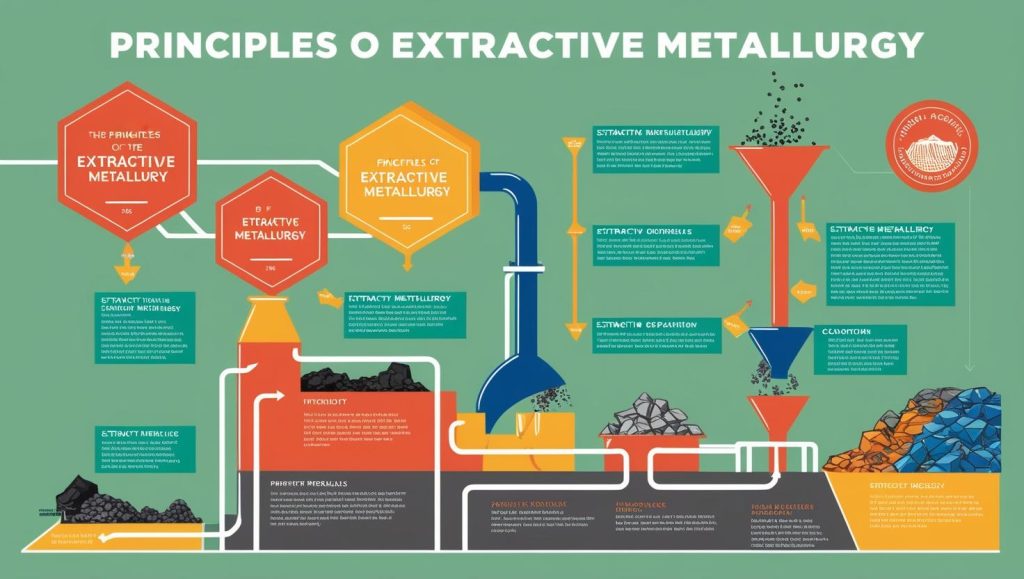Introduction to Principles of Extractive Metallurgy Homework Help
Are you struggling with your extractive metallurgy assignments? Understanding the Principles of Extractive Metallurgy homework help can make a significant difference in your studies. Extractive metallurgy is a crucial field in materials science that focuses on the extraction of metals from their ores and refining them for industrial use. From pyrometallurgy to hydrometallurgy and electrometallurgy, this subject encompasses various techniques essential in industries like mining, metal refining, and manufacturing.

In this detailed guide, we will cover:
- What extractive metallurgy is and its importance.
- The different methods of metal extraction.
- Key principles and processes involved.
- Real-world applications of extractive metallurgy.
- External resources for further study and assistance.
By the end of this guide, you will have a solid understanding of extractive metallurgy and be well-equipped to tackle your assignments effectively.
What is Extractive Metallurgy?
Extractive metallurgy is the science and practice of extracting metals from natural mineral resources. This process is essential in converting raw materials into valuable metal products used in various industries, including automotive, aerospace, and electronics. The field is divided into three main categories:
1. Pyrometallurgy
This method involves high-temperature processes to extract and refine metals. It includes techniques such as:
- Roasting: Heating ores in the presence of oxygen to remove impurities.
- Smelting: Using a furnace to extract metals from their ores.
- Refining: Further purification to obtain high-purity metals.
2. Hydrometallurgy
Hydrometallurgy involves the use of aqueous solutions to extract metals. Key processes include:
- Leaching: Dissolving metals from ores using chemical solutions.
- Solvent Extraction: Separating and concentrating the metal solutions.
- Electrowinning: Depositing metals from the solution using electrical current.
3. Electrometallurgy
This method uses electrical energy to extract and refine metals. The main techniques include:
- Electrorefining: Purifying metals using an electrolytic process.
- Electrolysis: Extracting metals from their compounds using an electric current.
For a more in-depth understanding, check out Extractive Metallurgy Basics.
Key Principles of Extractive Metallurgy
1. Thermodynamics and Kinetics
The efficiency of metal extraction depends on thermodynamic stability and reaction kinetics. Understanding Gibbs free energy and reaction rates helps optimize metallurgical processes.
2. Ore Beneficiation
Before extraction, ores undergo beneficiation to increase metal concentration. This includes:
- Crushing and grinding
- Froth flotation
- Magnetic separation
3. Reduction Reactions
Metals exist as oxides or sulfides in nature. Extractive metallurgy focuses on reducing these compounds to obtain pure metals using:
- Carbon reduction (Blast furnace for iron extraction)
- Hydrogen reduction
- Electrolytic reduction (Aluminum extraction from bauxite)
To learn more about metal extraction principles, visit Metallurgy Online Resources.
Applications of Extractive Metallurgy
Extractive metallurgy plays a crucial role in multiple industries:
- Mining Industry: Extracting copper, gold, and rare earth metals.
- Steel Production: Using blast furnaces for iron extraction and steel manufacturing.
- Battery Manufacturing: Extracting lithium and cobalt for lithium-ion batteries.
- Electronics Industry: Producing semiconductors and electronic components.
One of the key applications is gold extraction using cyanide leaching, which is widely used in the mining sector. Learn more about gold extraction methods at Gold Metallurgy.
External Resources for Principles of Extractive Metallurgy Homework Help
If you need additional assistance, consider these resources:
- Online Courses on Metallurgy – https://www.coursera.org/
- Metallurgical Engineering Books – https://www.springer.com/
- Extractive Metallurgy Research Papers – https://www.sciencedirect.com/
- Metallurgy Discussion Forums – https://www.researchgate.net/
Tips for Efficiently Completing Extractive Metallurgy Homework
- Understand the Basics: Review fundamental concepts before tackling complex problems.
- Use Flowcharts: Visualizing processes like leaching or electrolysis helps in comprehension.
- Leverage Software Tools: Applications like HSC Chemistry help simulate metallurgical reactions.
- Join Study Groups: Discussing with peers can enhance your understanding.
- Seek Professional Help: If you’re stuck, online tutors and experts can provide guidance.
Conclusion: Get the Best Principles of Extractive Metallurgy Homework Help
Extractive metallurgy is a fundamental field that enables the extraction and purification of metals essential for industrial applications. Whether you’re studying pyrometallurgy, hydrometallurgy, or electrometallurgy, mastering these concepts is crucial for success in your coursework and future career.
With this comprehensive Principles of Extractive Metallurgy homework help guide, you now have the necessary knowledge and resources to excel in your assignments. Keep practicing, explore additional resources, and reach out for expert guidance whenever needed.


